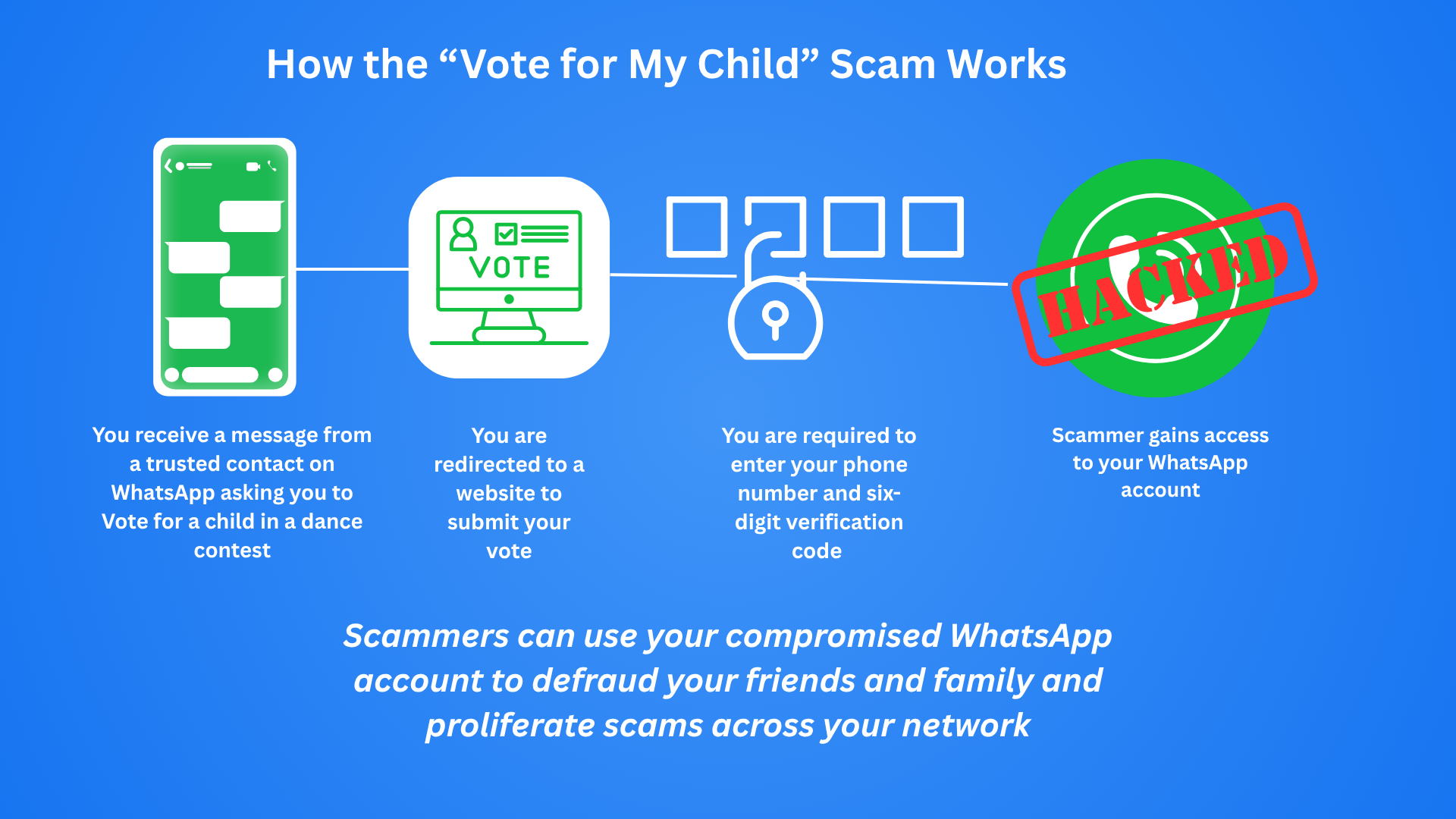WhatsApp ‘Vote for My Child’ Scams Are Rapidly Spreading Across Europe, Bitdefender Lab Warns

If you’ve ever wondered how someone could lose access to their WhatsApp account in a matter of seconds, the answer lies in cleverly crafted scams. Cybercriminals don’t need advanced malware or sophisticated hacking tools — instead they exploit trust, urgency, and empathy.
Bitdefender Labs researcher Razvan Gabriel Gosa has been monitoring a rapidly expanding campaign that exploits WhatsApp users through fraudulent “voting contests” to take over accounts and steal money. This “Vote for My Child” scam hijacks accounts by tricking users into sharing their verification codes, turning friends and family into unknowing amplifiers of the fraud.
In recent months, we’ve been monitoring this scam as it quickly expands across Europe. Although they have been around for years, these scams are continuously evolving and expanding, with attackers now deploying 177 fraudulent domains and 554 unique URLs, targeting thousands of users over the past two months alone.
Their MO is straightforward: criminals steal WhatsApp accounts and use them as launchpads to spread fraud and extort money.
Geographic Breakdown of Top Targets
- Poland – 41%
- Romania – 29%
- Germany – 20%
- Czech Republic – 2%
- Italy – 1%
- Austria – 1%
The campaign is clearly regionalized across Central and Eastern Europe, with a smaller but noticeable footprint extending into Western Europe (Spain, the UK), the United States, and even Kazakhstan.
How the Scam Works

Step 1: The Emotional Hook
Victims receive a WhatsApp message from someone they know, such as a friend, colleague, or family member. The message might say:
“Hi! Please vote for Adeline in this contest, she’s the daughter of a close friend. The main prize is a scholarship abroad. Thank you so much!”
Because the request comes from a contact, victims are much more likely to click the link.
Step 2: The Fake Contest Site
The link leads to a professional-looking phishing website with a name like poldance.top or thebestdance.top. These sites showcase photos of young girls in dance or gymnastics poses, complete with:
- “Vote” buttons
- Vote counters and fake statistics
- Promises of prizes, scholarships, or cash rewards









Step 3: The Trap
To “vote,” users are asked to:
- Enter their phone number
- Input the six-digit WhatsApp verification code they receive
Unknowingly, they hand this code straight to the attackers, who then pair their own device with the victim’s account.
Step 4: The Takeover
With full control of the account, attackers:
- Replicate the scam by sending the same voting request to all contacts
- Escalate to money fraud by asking for 1,800 RON (~€360) and later an additional 2,000 RON (~€400) under urgent pretenses
- Trigger account suspensions after mass spamming
List of fraudulent URLs per target destinations:
Germany
- https://thebestdance[.]world/home/voteGR3
- https://dancechart[.]life/home/voteDE3
Romania
- https://dansului-battle[.]live/home/vote
- https://dancebattle[.]life/home/vote
- https://dattaliadansul[.]top/home/vote
- https://concursiarna[.]com/home/vote3
Poland
- https://best-dance[.]live/home/vote8
- https://best-dance[.]live/home/vote4
- https://gimnast[.]life/home/vote3
Why Even Savvy Users Fall Victim
These scams are particularly dangerous because they are designed to bypass rational thinking. By combining:
- Familiarity (messages come from a known contact),
- Urgency (act now, vote fast, send money immediately), and
- Emotional triggers (helping a child, saving a friend in trouble),
attackers manipulate victims into ignoring warning signs.
Even digitally literate users can be fooled when trust and empathy override caution.
Protecting the Most Vulnerable: Helping Elderly Relatives Stay Scam-Free
Older adults are frequent targets because they:
- Place more trust in familiar names
- Have lower awareness of modern online scams
- May hesitate to verify unusual requests
Proactive steps to keep them safe:
- Enable two-step verification on their WhatsApp accounts
- Explain common scams in simple, easy-to-understand language
- Set up phone calls as a rule for confirming unusual requests
Use family cybersecurity tools to monitor and protect their devices
Bitdefender offers multiple layers of protection against scams like these:
- Bitdefender Scamio – Your free AI scam-detecting assistant. Forward any sketchy message, link, or QR code to Scamio and get instant answers.
- Bitdefender Link Checker – Check if a URL is safe before you click, directly from your browser for free.
- Bitdefender Premium Security with Scam Protect – A complete security suite that blocks phishing links, protects identities, and includes Scam Protect, which includes your personal scam-detecting assistant, scam wave alerts in your region, call defense, and remote access scam protection.
What to Do If You’re Targeted or Compromised
- Never share your WhatsApp verification code with anyone — not even friends or family
- Verify requests for money or favors through a direct phone call
- Report suspicious messages within WhatsApp (“More → Report”)
- If hacked:
- Try to regain control by requesting a new verification code
- Contact WhatsApp support at support@whatsapp.com
- Notify your bank if money has been transferred
- Inform your contacts about the compromise
Cybersecurity Awareness Month Reminder
These scams are part of a broader increase in social engineering frauds. As we mark Cybersecurity Awareness Month, it’s critical to remember:
- Scammers adapt quickly, using old tricks in new disguises
- Anyone — from teenagers to grandparents — can be fooled
- Awareness campaigns and technical safeguards must work together
Bitdefender protects you and your family on multiple levels, offering tools to:
- Block malicious links before you click
- Monitor and safeguard your identity
- Secure messaging and social accounts with advanced protection
- Provide family-wide coverage, ensuring even the most vulnerable relatives are protected
While the “Vote for my child” and “Urgent money transfer” scams aren’t entirely new, they’re expanding rapidly and claiming more victims every day. Cleverly crafted messages combined with emotional manipulation make them effective. The damage they inflict extends beyond financial loss — accounts are compromised, reputations are damaged, and trust is compromised.
The best defense is awareness, prevention, and layered security. By enabling two-step verification, educating loved ones, and using trusted cybersecurity solutions, families can stay a step ahead of fraudsters.
This Cybersecurity Awareness Month, take action: talk to your family, check your WhatsApp settings, and make sure everyone — especially older adults — knows how to stay scam-free too.
tags
Author
Alina is a history buff passionate about cybersecurity and anything sci-fi, advocating Bitdefender technologies and solutions. She spends most of her time between her two feline friends and traveling.
View all postsYou might also like
Bookmarks
